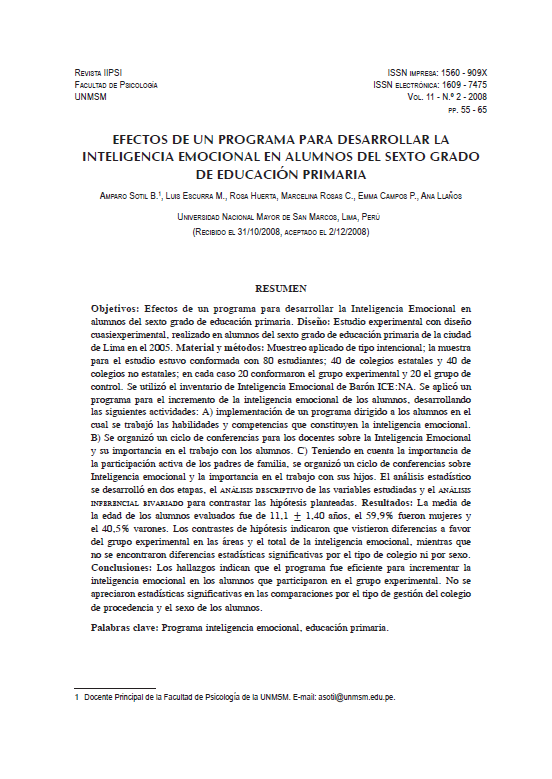Efectos de un programa para desarrollar la inteligencia emocional en alumnos de sexto grado de educación primaria
Date
2008Author
Sotil B., Amparo
Escurra M., Luis
Huerta R., Rosa
Rosas C., Marcelina
Campos P., Emma
Llaños, Ana
Metadata
Show full item recordAbstract
Objetivos: Efectos de un programa para desarrollar la Inteligencia Emocional en
alumnos del sexto grado de educación primaria. Diseño: Estudio experimental con diseño
cuasiexperimental, realizado en alumnos del sexto grado de educación primaria de la ciudad
de Lima en el 2005. Material y métodos: Muestreo aplicado de tipo intencional; la muestra
para el estudio estuvo conformada con 80 estudiantes; 40 de colegios estatales y 40 de
colegios no estatales; en cada caso 20 conformaron el grupo experimental y 20 el grupo de
control. Se utilizó el inventario de Inteligencia Emocional de Barón ICE:NA. Se aplicó un
programa para el incremento de la inteligencia emocional de los alumnos, desarrollando
las siguientes actividades: A) implementación de un programa dirigido a los alumnos en el
cual se trabajó las habilidades y competencias que constituyen la inteligencia emocional.
B) Se organizó un ciclo de conferencias para los docentes sobre la Inteligencia Emocional
y su importancia en el trabajo con los alumnos. C) Teniendo en cuenta la importancia de
la participación activa de los padres de familia, se organizó un ciclo de conferencias sobre
Inteligencia emocional y la importancia en el trabajo con sus hijos. El análisis estadístico
se desarrolló en dos etapas, el análisis descrip tivo de las variables estudiadas y el análisis
inferencial bi variado para contrastar las hipótesis planteadas. Resultados: La media de
la edad de los alumnos evaluados fue de 11,1 ± 1,40 años, el 59,9% fueron mujeres y
el 40,5% varones. Los contrastes de hipótesis indicaron que vistieron diferencias a favor
del grupo experimental en las áreas y el total de la inteligencia emocional, mientras que
no se encontraron diferencias estadísticas significativas por el tipo de colegio ni por sexo.
Conclusiones: Los hallazgos indican que el programa fue eficiente para incrementar la
inteligencia emocional en los alumnos que participaron en el grupo experimental. No se
apreciaron estadísticas significativas en las comparaciones por el tipo de gestión del colegio
de procedencia y el sexo de los alumnos.
=== === ABSTRACT=== ====
Objective: Effects of a program to develop the Emotional Intelligence in pupils of the sixth
degree of primary education. Design: Experimental study with design cuasi experimental,
realized in pupils of the sixth degree of primary education of the city of Lima in 2005.
Material and methods: Applied Sampling was of the intentional one; the sample for the
study was shaped by 80 students; 40 of state colleges and 40 of not state colleges, in every
case 20 shaped the experimental group and 20 the group of control. There was in use the
inventory of Baron ICE:NA’s Emotional Intelligence. A program was applied for increase
of the emotional intelligence of the pupils in which the following activities developed: A)
implementation of a program directed the pupils at which one was employed the skills
and competitions that constitute the emotional intelligence. B) One organized a cycle of
conferences for the teachers on the Emotional Intelligence and his (her, your) importance
in the work with the pupils. C) Having in it (he, she) counts (tells) the importance of the
active participation of the family parents, one organized a cycle of conferences on emotional
Intelligence and the importance in the work with his (her, your) children. The statistical
analysis developed in two stages, the descrip tive analysis of the studied variables and the
analysis inferencial bi variado to confirm the raised hypotheses. Results: The average of
the age of the evaluated pupils was of 11.1 ± 1.40 years, 59,9 % was women and 40,5 %
was males. The contrasts of hypothesis indicated that they dressed differences in favour of
the experimental group in the areas and the whole of the emotional intelligence, whereas they
found statistical significant differences neither for the type of college nor for sex. Conclusions:
The finds indicate that the program was efficient to increase the I. E. in pupils who took part
in the experimental group. They did not appreciate significant statistics in the comparisons
for the type of management of the college of origin and the sex of the pupils

